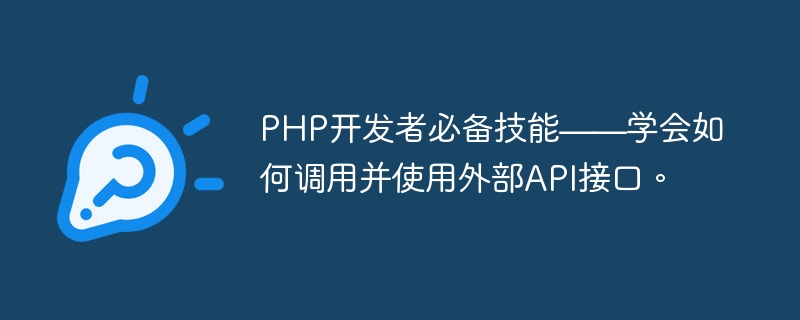

Essential skills for PHP developers - learn how to call and use external API interfaces
With the development of the Internet, more and more applications and websites require Interact with external API interfaces to obtain more data and functions. As a PHP developer, learning how to call and use external API interfaces is an essential skill. This article will introduce some basic knowledge and code examples to help PHP developers better understand and apply API interfaces.
What is API interface?
API (Application Programming Interface) is an application programming interface, which is a specification that defines how to communicate between different software. Through APIs, different applications can interact with each other and share data and functionality. External API interfaces are interfaces provided by other websites or services. We can obtain data or complete specific functions by calling these interfaces.
Steps to call external API interface:
The following takes calling a weather API interface as an example to show specific code examples:
// Use cURL library to send HTTP requests
function callAPI($url, $method = 'GET', $data = false) {
$curl = curl_init(); curl_setopt($curl, CURLOPT_URL, $url); curl_setopt($curl, CURLOPT_RETURNTRANSFER, true); if ($method == 'POST') { curl_setopt($curl, CURLOPT_POST, 1); if ($data) { curl_setopt($curl, CURLOPT_POSTFIELDS, http_build_query($data)); } } $response = curl_exec($curl); curl_close($curl); return $response;
}
// Get weather data
$apiKey = 'your_api_key';
$city = 'beijing';
$url = "http://api.weather.com/v1/weather?key=$apiKey&city=$city";
$response = callAPI($url );
// Process the returned JSON data
$data = json_decode($response, true);
if ($data['status'] == 'OK') {
echo "当前城市:".$data['city']."
";
echo "天气情况:".$data['weather']."
";
echo "当前温度:".$data['temperature']."
";
} else {
echo "获取天气信息失败";
}
?>
The above code example shows how to use the cURL library to send an HTTP request and parse the returned JSON data. You need to replace the API key and city information in $url to run this example normally. The specific API interface URL and Parameters can be found in the interface document.
In addition to calling the API interface for GET requests, you can also call the interface for POST requests. The callAPI function in the code example already supports POST requests. You can follow the requirements of the API interface. Set the $data array to send parameters when sending a POST request.
Summary:
As a PHP developer, it is very important to learn how to call and use external API interfaces. Send HTTP requests by using the cURL library, and By processing the returned data, we can implement data interaction with other applications and services. This article provides a simple code example, I hope it will be helpful to you. In practice, you may encounter more complex API interfaces that require There are more parameters and processing logic, but after mastering the basic principles, you can call and develop according to specific needs and interface documents.
The above is the detailed content of Essential skills for PHP developers - learn how to call and use external API interfaces.. For more information, please follow other related articles on the PHP Chinese website!